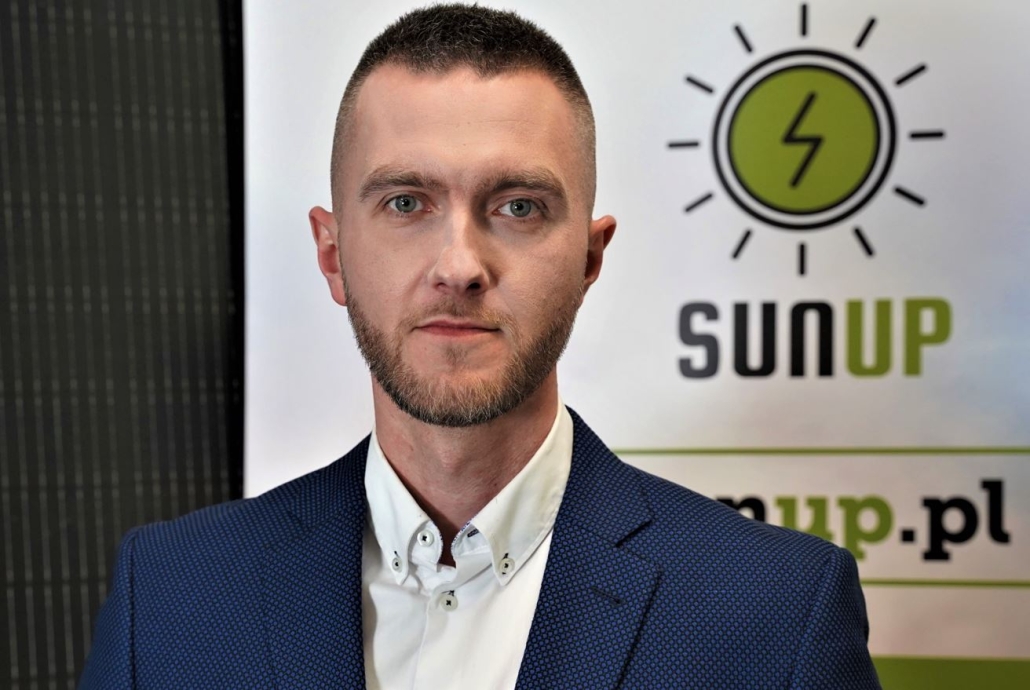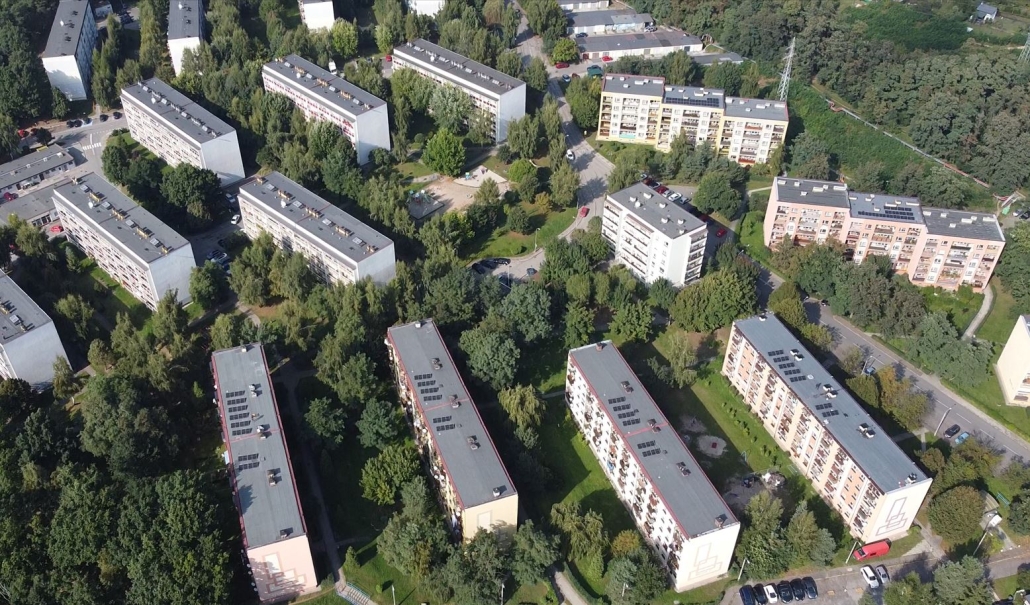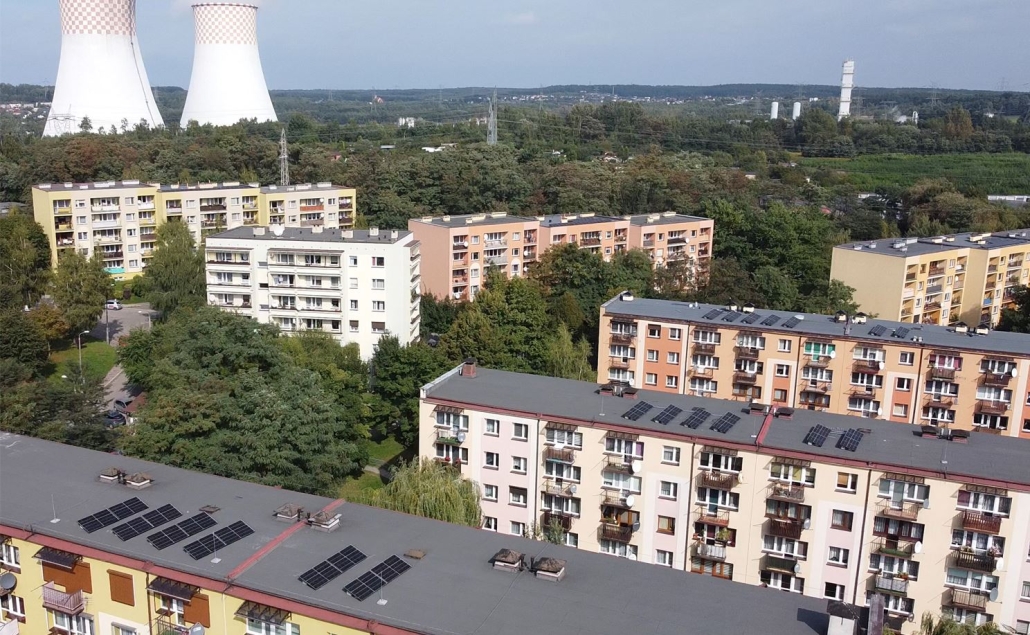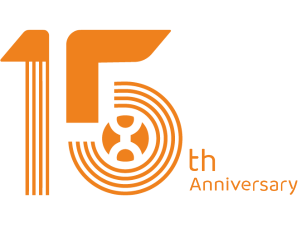Having taken part in the rapid residential solar market growth in Poland over the last 2 years, APsystems is committed to continue providing innovative microinverter solutions perfectly suited to Polish residential and small-scale commercial demand and helping solar professionals differentiate from competition. The example of the installation company SunUp, based in the Silesian district in Poland, is a good illustration of how the solar installer landscape in Poland is currently evolving towards smarter AC microinverter-based solar solutions to enhance comprehensive services related to PV installations for its customers. It is also a way to address consumer demand more proactively and propose a full energy efficiency solution approach that includes heat pumps together with solar and self-consumption for households .
SunUp background

Let’s take a closer look at SunUp… It all started with its founder, Michał Klimek, who gained extensive experience managing energy projects in Poland and abroad, in Malaysia, Iceland, the United States and Sweden, before setting up his own solar installation company SunUp in Poland in 2019.
Beyond the founder’s ecological awareness, the main trigger pushing Mr Klimek to set up SunUp was the opportunity offered by the utility companies and the Polish government to Polish people to cover most of their electricity needs with solar thanks to an annual billing mechanism reaching over 80% of the self-consumption rate, using the network as a virtual battery system throughout the year.
Two years later, and despite a sensitive period with the pandemic, SunUp boasts over 60 residential and 4 commercial installations completed with APsystems microinverters, reaching over 400 kWp. At the end of 2021, Sunup will complete a 49.95 kWp installation based on APsystems microinverters. In addition to PV installations, SunUp also offers its customers ecological heat pumps that are complementary to PV systems, helping to increase the building’s auto consumption ratio.
A multi-residential project in Rybnik
A recent housing cooperative project located in Rybnik, Poland, is a good example of this green energy transition dynamic. This project consisted in 7 multi-family residential buildings, belonging to the Rybnik Housing Cooperative, which had objectives to reduce energy costs for its investors via its own solar-powered roofs. It was also a way for the housing corporation to contribute to a cleaner way to generate electricity without using fossil fuels, which remain the vast majority of conventional power plants in Poland.
The result is 11 photovoltaic installations for a total project size of approximately 42 kWp.

Mr Klimek explained the main challenges on this project:
“Firstly, we had to look for a safe, reliable solution. During the engineering phase, we realized that we were lacking space inside the building for any traditional string inverters. , the roofs built in the late 70’s each had a slightly different angle and a variety of orientations. The solutions needed a high degree of flexibility… For all these reasons, multi-module microinverters from APsystems appeared to be the best solution we could propose to our customer.”
“Another big advantage with APsystems is that each PV module benefits from its own MPP tracker, so we do not have to worry about any problems that could occur with production for our client. We can easily supervise the production of any PV module remotely. And here we are talking about 106 modules.” He concluded.

The advantages of microinverters
Leveraging a safe, more productive, and easier to maintain AC solution was key for SunUp to select APsystems microinverters for this project. It strengthened SunUp’s team confidence in building reliable PV installations in challenging conditions under a tight time schedule and budget.
With the rapid development of self-consumption in both residential and larger projects, accelerated by a constant energy price increase, APsystems is very confident in the success of its current and upcoming multimodule microinverter range with the new DS3 dual series and QT2 3-phase Quad in Poland. As a proud member of Sunspec Alliance and SBF in Poland, APsystems continues to be a leader in the ever-growing solar MLPE segment offering smart and easy-to-install microinverter solutions.
 The Future of Solar & Storage: How APsystems Is Using AI to Build a Smarter Energy EcosystemAugust 14, 2025 - 7:39 pm
The Future of Solar & Storage: How APsystems Is Using AI to Build a Smarter Energy EcosystemAugust 14, 2025 - 7:39 pm Discover the Future of Solar with APsystems at Solar & Storage Live 2025!July 22, 2025 - 2:22 pm
Discover the Future of Solar with APsystems at Solar & Storage Live 2025!July 22, 2025 - 2:22 pm AI Navigates the Future of Solar & Energy Storage: APsystems Builds a Diverse Smart Energy EcosystemJune 8, 2025 - 11:57 pm
AI Navigates the Future of Solar & Energy Storage: APsystems Builds a Diverse Smart Energy EcosystemJune 8, 2025 - 11:57 pm Visit Us at Intersolar Europe 2025!April 11, 2025 - 6:23 am
Visit Us at Intersolar Europe 2025!April 11, 2025 - 6:23 am INSTALLERS ! BOOST YOUR SALES WITH APSTORAGE EXCLUSIVE OFFER !April 10, 2025 - 2:37 pm
INSTALLERS ! BOOST YOUR SALES WITH APSTORAGE EXCLUSIVE OFFER !April 10, 2025 - 2:37 pm

Join the APsystems European team !
/in Press Coverage/by Max BoironBased on a successful growth trajectory that started over 7 years ago in Europe, APsystems continues to expand in the European region with key open positions available in the fields of sales, technical support and order administration.
Expert in power electronics at the module level (MLPE) for over 12 years, APsystems designs, manufactures and markets highly innovative solar microinverters to bring solar energy to communities and businesses all over the world. APsystems has more than 130 patents on its products and has become # 1 multi-module microinverter manufacturer in the world. APsystems is a listed company on the Shanghai stock exchange.
With European offices in Amsterdam, Netherlands and Lyon, France, join a profitable human-sized company serving customers in more than 100 countries around the world.
Check the details on our current available job offers:
– Sales Manager Netherlands
– Business development Manager Germany & Austria
– Business development Manager Italy
– Technical Support Specialist
– Order administration assistant
If you feel you have the right skills and experience to meet one of the above job descriptions, please send your application to : l.winstanley@apsystems.com
Join us, we’re looking for committed, fun and passionate people to help us make a difference!
APsystems is proud to receive the “Top Brand PV Seal” for inverters on the French and Dutch markets from EUPD Research
/in Press Coverage/by Max BoironThe “Top Brand PV SEAL award” given to APsystems, is the outcome of an analysis based on a survey with 100 French PV installers and 100 Dutch PV installers. The data collected from installers during the second half of 2021 form the basis of this result.
Based on years of research, EUPD Research has developed an annual evaluation model to focus on aspects of successful brand management. The seal is designed to present a complete view of the brand, in which various characteristics of the product play a role.
“For the 3rd consecutive year, APsystems has received the TOP PV brand seal among installers in France and we are very pleased that this award has also been recognized by Dutch installers for the 1st time this year”. said Maxime Boiron, Global Marketing Director, APsystems.” It is extremely gratifying for us to see that our company continues to be recognized as a leading provider of Module Level Power Electronics solutions for the solar industry.
APsystems continues to consolidate its leadership in multi-module microinverter solutions that offer innovative products designed to last. A new generation of microinverters for the residential market was introduced successfully on the market a few months ago. The DS3 series, the 3rd generation of dual microinverters, offers power options to solar professionals from 600 to 960 W AC with interactivity features with power grids (RPC), 97% peak efficiency and 20% fewer components compared to the previous generation.
Last year, APsystems’ global cumulative product shipments surpassed 2 GW, representing close to 3 terawatt hours (TWh) of total energy produced, with a carbon offset of more than 2 million tons of CO2.
APsystems offers the widest range of microinverter solutions to solar professionals and continues to be a leader in photovoltaic innovation, serving its clients in more than 100 countries around the world, with local teams spread across Europe and offices in Lyon France, and Amsterdam, in the Netherlands.
Final reminder: Download EMA Manager today for ECU set up!
/in General News/by APsystemsThis is reminder to all professional solar installers who use APsystems: the ECU App currently in the App Store and Google Play Store is scheduled for removal on March 25th. Installers need to download the EMA Manager which now includes all the functions of the ECU App, accessible right from the home screen!
Not only that, but the EMA Manager conveniently streamlines your monitored system installations with its fleet view and system status, and provides installers with many new and improved features for remote site management.
Benefit from all the existing features available in the EMA web portal, right on your smartphone or tablet app using a single sign-in. Real-time systems check, diagnostics capabilities and troubleshooting are now in the palm of your hand with the EMA Manager App. In addition to the inclusion of the ECU App capabilities, the new app also provides additional features, including: ECU and microinverter connectivity, energy production, system troubleshooting, and full site configuration and monitoring capability without the need to be physically on-site.
Download it from the App Store or Google Play Store today!
Invitation SolarSolutions April ’22
/in Events/by Mark HagenbeekDiscover the new QT2 microinverter at SolarSolutions.
You are invited to get acquainted with the latest APsystems products from 12th to 14th of April ’22 in Vijfhuizen, Netherlands.
From Tuesday 12th to Thursday 14th April 2022 we will participate in the Solar Solutions International trade fair in Expo Haarlemmermeer. Visit us at booth C10!
Solar Solutions International is one of the largest solar energy trade shows in Europe. You can get information during the fair about both energy generation and sustainable heating.
At our APsystems stand you can already become acquainted with the new QT2. The QT2 microinverter is a 3-phase inverter connecting 4 solar panels, for a maximum output power of up to 2000VA, the solution for residential and commercial PV.
In addition to the microinverters, APsystems also offers monitoring and analysis software. When connected to the advanced EMA module (ECU Unit), a user-friendly interface allows you to analyse the performance of each solar panel and microinverter, detecting and even resolving any malfunctions. Consumption monitoring is also an option.
Would you like to visit us at booth C10? If so we are offering you a free ticket after registration with the code APSYSTEMS.
You save no less than 75€ ! We look forward to welcoming you at Solar Solutions.
APsystems Surpasses 2 GW of Shipments Worldwide
/in Article, General News, Press Releases/by APsystemsFOR IMMEDIATE RELEASE
JIAXING, China – March 7th, 2022 – APsystems, the global leader in multi-platform solar MLPE devices, today announced it has surpassed 2 gigawatts (GW) of installed capacity to date in 2022. APsystems now has more than 146,000 solar installation sites in over 100 countries utilizing its groundbreaking microinverters and rapid shutdown devices (RSDs).
The announcement comes as APsystems passes the 1-million-unit mark for RSD shipments under its APsmart brand, another major achievement for the company. Since launching in 2019, APsmart business units have experienced solid growth supported by an innovative range of SunSpec compliant rapid shutdown devices including single and dual-module solutions.
“Reaching two gigawatts is a tremendous accomplishment for our global organization and a milestone we are all very proud of,” said Dr. Zhi-min Ling, co-founder and chairman of APsystems. “Our customers around the world recognize the tremendous value and benefits of using APsystems products. This milestone is the result of our commitment to consistently add to that value and support our customers’ goals.”
In addition to the high-efficiency power conversion provided by APsystems products in sites around the world, the 2 GW milestone translates to roughly 2.8 terawatt hours (TWh) of total energy produced, with a carbon offset of more than 2 million tons of CO2.
“APsystems has been a benchmark leader in solar energy since 2010,” said Olivier Jacques, APsystems president of global business units and global executive vice-president. “We have been recognized for creating the best-selling native 3-phase quad microinverter, and, recently, the most powerful range of dual-module microinverters in the world with the DS3 series. We are driven to push the boundaries of solar power.”
APsystems’ success in reaching the 2 GW milestone as cumulative shipments of microinverters and RSD solutions, is attributed, in large part, to its global dedication to innovation combined with the experience and capabilities of its employees in each business unit around the world. Driven by customer demand, the power electronics design experts comprising APsystems’ engineering and R&D teams employ the latest breakthroughs in power inversion circuitry, semiconductor device technology, high-speed encrypted communication protocols and intelligent control. APsystems’ newly introduced product line, the DS3 microinverter series, is a continuation of its ever-evolving roadmap centered on disruptive solar technology.
Additionally, APsystems continues to invest in its gateway software, inverter firmware, and its cloud-based online platform to protect installer and consumer data while providing customers with the best possible user experience. APsystems’ information security management system (ISMS) is now certified to ISO/IEC 27001:2013 (also known as ISO27001), the international standard for information security, and encrypted Zigbee technology has been integrated as a standard feature in all new generations of multi-module microinverters.
People, innovation and leading-edge system design and security are part of the framework that has propelled APsystems to the forefront of global solar MLPE system leadership. APsystems would like to thank all its customers, partners, and employees for being part of this tremendous achievement, and for positively impacting its story, and indeed the world itself, for the better.
Interview on DS3 in Easy Engineering Magazine
/in Article, General News, Press Coverage/by APsystemsGreat interview and discussion on the new DS3 product line in Easy Engineering Magazine featuring our own Maxime Boiron!
Read the full article here: https://easyengineering.eu/interview-with-apsystems/
APsystems Photo Contest
/in Article, General News/by Mark HagenbeekDS3 PHOTOS CONTEST EXTENDED UNTIL JUNE 30th ! COMPETITION OPEN TO PROFESSIONAL INSTALLERS USING THE DS3 MICROINVERTER.
PHOTO CONTEST FOR SOLAR PROFESSIONALS!
Submit the best photos of your installations with DS3 microinverters and get the chance to win € 500 in vouchers. Winners each month until June 30th, 2022.
Take part in the photography competition that APsystems is launching this winter. Stand out from competition with your DS3 micros in action! Get creative and you could win € 500.
Exclusively reserved for installers using our DS3 series of microinverters.
Share your best project with us – what sets it apart, from conception to commissioning. Is it an exceptional or original project? Is its roofing unique, complex, is the economic model supporting it innovative? Does the type of building that accommodates have particular constraints? Explain it to us and share the details of the project (using the form on the right), including a brief description of the installation. Be sure to include photos and close-ups that show our DS3 microinverters in action. Entries will be judged by the APsystems team.
Take this opportunity to not only try to win 500 € but also gain visibility through projects that will be showcased on our website and other communication platforms. Submit your application using the form on this page. If the photos are too large (> 5MB), we invite you to send them by shared transfer link or by email to emea@apsystems.com.
Please read the terms and conditions of the contest before entering. If you have any questions, you can use the form, and we will get back to you as soon as possible. This competition is open all winter until the end of June 2022. For residential or commercial solar applications: submit your best photos of installations with DS3 microinverters and you could WIN € 500€.
Submit your images on this page.
Installer portrait in Poland : SunUp ( article published on www.gramwzielone.pl on November 8th)
/in Article, General News/by Max BoironHaving taken part in the rapid residential solar market growth in Poland over the last 2 years, APsystems is committed to continue providing innovative microinverter solutions perfectly suited to Polish residential and small-scale commercial demand and helping solar professionals differentiate from competition. The example of the installation company SunUp, based in the Silesian district in Poland, is a good illustration of how the solar installer landscape in Poland is currently evolving towards smarter AC microinverter-based solar solutions to enhance comprehensive services related to PV installations for its customers. It is also a way to address consumer demand more proactively and propose a full energy efficiency solution approach that includes heat pumps together with solar and self-consumption for households .
SunUp background
Let’s take a closer look at SunUp… It all started with its founder, Michał Klimek, who gained extensive experience managing energy projects in Poland and abroad, in Malaysia, Iceland, the United States and Sweden, before setting up his own solar installation company SunUp in Poland in 2019.
Beyond the founder’s ecological awareness, the main trigger pushing Mr Klimek to set up SunUp was the opportunity offered by the utility companies and the Polish government to Polish people to cover most of their electricity needs with solar thanks to an annual billing mechanism reaching over 80% of the self-consumption rate, using the network as a virtual battery system throughout the year.
Two years later, and despite a sensitive period with the pandemic, SunUp boasts over 60 residential and 4 commercial installations completed with APsystems microinverters, reaching over 400 kWp. At the end of 2021, Sunup will complete a 49.95 kWp installation based on APsystems microinverters. In addition to PV installations, SunUp also offers its customers ecological heat pumps that are complementary to PV systems, helping to increase the building’s auto consumption ratio.
A multi-residential project in Rybnik
A recent housing cooperative project located in Rybnik, Poland, is a good example of this green energy transition dynamic. This project consisted in 7 multi-family residential buildings, belonging to the Rybnik Housing Cooperative, which had objectives to reduce energy costs for its investors via its own solar-powered roofs. It was also a way for the housing corporation to contribute to a cleaner way to generate electricity without using fossil fuels, which remain the vast majority of conventional power plants in Poland.
The result is 11 photovoltaic installations for a total project size of approximately 42 kWp.
Mr Klimek explained the main challenges on this project:
“Firstly, we had to look for a safe, reliable solution. During the engineering phase, we realized that we were lacking space inside the building for any traditional string inverters. , the roofs built in the late 70’s each had a slightly different angle and a variety of orientations. The solutions needed a high degree of flexibility… For all these reasons, multi-module microinverters from APsystems appeared to be the best solution we could propose to our customer.”
“Another big advantage with APsystems is that each PV module benefits from its own MPP tracker, so we do not have to worry about any problems that could occur with production for our client. We can easily supervise the production of any PV module remotely. And here we are talking about 106 modules.” He concluded.
The advantages of microinverters
Leveraging a safe, more productive, and easier to maintain AC solution was key for SunUp to select APsystems microinverters for this project. It strengthened SunUp’s team confidence in building reliable PV installations in challenging conditions under a tight time schedule and budget.
With the rapid development of self-consumption in both residential and larger projects, accelerated by a constant energy price increase, APsystems is very confident in the success of its current and upcoming multimodule microinverter range with the new DS3 dual series and QT2 3-phase Quad in Poland. As a proud member of Sunspec Alliance and SBF in Poland, APsystems continues to be a leader in the ever-growing solar MLPE segment offering smart and easy-to-install microinverter solutions.
Read the full article in POLISH on Gramwzielone.pl
APsystems Introduces the DS3, the World’s Most Powerful Dual-Module Microinverter series
/in Events, General News/by Max BoironAPsystems unveils the DS3 series, a dual-module, single phase microinverter product line for residential and commercial solar applications at the Solar Solutions International trade show in The Netherlands.
A new, groundbreaking design for APsystems, the DS3 series is launching with multiple power offerings in several major global markets, with outputs up to 960VA—making it the most powerful dual-module microinverter in the world and reflecting APsystems’ commitment to powerful innovation with global capability.
The new platform architecture, built from the ground up by the power electronics design experts comprising APsystems’ engineering and R&D teams, employs the latest breakthroughs in power inversion circuitry, semiconductor device technology, high-speed communication and intelligent control.
The DS3 series is designed to be paired with virtually any choice of PV module type and size, including 60 and 72-cell modules, 120 and 144 split-cell modules, as well as bi-facial modules. With multiple output ranges available, installers can capably find an optimal DS3 microinverter model to match their choice of PV module type, size and capacity to maximize the power output and increase energy harvest. The new product line is also fully compatible with APsystems’ existing QS1 and YC600 microinverters as well as ECU-R, ECU-C and ECU-B gateway devices.
DS3 Series microinverters offer the following features and benefits:
The DS3 Series will launch in most regions in Q4 of this year with the following models available by market:
The DS3 series continues to build on the successful APsystems line of multi-module microinverters, offering reduced logistics costs, faster installation, improved communication and connection features, and a wide MPPT voltage range for greater energy harvest during low light conditions.
DS3 series microinverters will be on display at the APsystems stand #C9.1 at the Solar Solutions International, the largest trade show for solar energy in Northwest Europe, September 28-30 at the Expo Haarlemmermeer in The Netherlands.
Invitation Solar Solutions September ’21
/in Events, General News/by Mark HagenbeekDiscover the new APsystems microinverters at Solar Solutions.
You are invited to the Solar Solutions trade fair in the Netherlands to get acquainted with the latest products and our professionals from 28 to 30 September ’21 in Vijfhuizen.
Solar Solutions is the largest special interest fair for heating, cooling and ventilation. You can find information about both energy generation and sustainable heating. At the APsystems booth you can get to know the latest microinverter, the DS3, an advanced microinverter for connecting 2 solar panels, for a maximum output power of almost 900VA, the solution for residential and commercial PV. In addition to the APsystems café, where we would like to welcome you, the prizes will also be handed over to the winners of the APsystems photo competition. The best entries during the summer months will be rewarded with a Bol.com voucher of no less than €500! Dutch installers can still participate in September. Look here for the landing page (in Dutch).
During Solar Solutions, manufacturers, distributors and installers from different countries show their latest products, solutions and concepts.
As well as its microinverters, APsystems also offers monitoring and analysis software. When connected to the advanced EMA (Energy Communication Unit) module, a user-friendly interface allows you to analyze the performance of each solar panel and each microinverter and detect and even resolve any malfunctions. Consumption monitoring is also an option. Visit us during Solar Solutions at booth C9.1 at the Expo Haarlemmermeer in Vijfhuizen, Netherlands and let us inform you about the smart products of APsystems. With the code APSYSTEMS you can get free access, all you have to do is register with the invitation code and save 75 € !
We look forward seeing you at Solar Solutions.